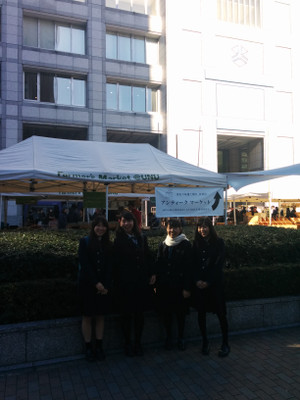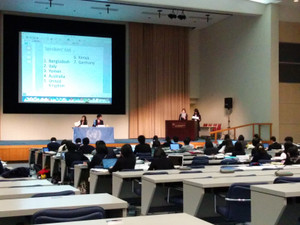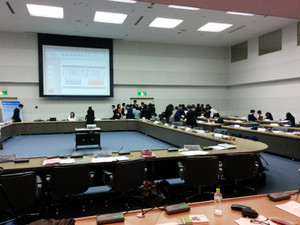模擬国連全国大会に参加しました

English translation is given below.
11月15日~16日にかけて、東京の国連大学で開催された第8回全日本高校模擬国連大会に、本校の生徒4名が参加しました。
Bangladesh大使 2名
Philippina大使 2名
<大会初日>
今回のテーマは「食糧問題」で、世界人口が約90億人に達するとされている2050年においていかに食料を確保するかという問題について各国代表が集まって話し合うという設定で行われました。
初日の午前中には、開会式に引き続き基調講演が行われました。その後昼食の時間となりましたが、その間にすでに各学校の代表である多くの大使たちが、本格的な会議に向け活発な交流をしていたのが印象的でした。
初日の午後には、いよいよ模擬国連が開始されました。議長による英語での議事進行のもと、各国大使によるこちらもまた英語での公式発言が相次いでなされました。本校の代表であるBangladesh大使も自国の立場を堂々と主張しました。

この公式発言が数カ国続いた後,各国大使から動議(motion)が提出され、非公式討議の時間に移ります。ここから本格的な交渉が開始されます。

写真はunmoderated caucusと呼ばれる非公式討議の様子です。それぞれ事前に準備してきた資料やまとめてきた主張などをもとに、他国の大使と議論を行い、お互いの主張のずれなどを確認したり、相手国の主張の根拠などを探っていきます。これと公式発言を交互に何度か繰り返し、各国の主張を盛り込んだワーキングペーパー(WP)とよばれる文書を作成・提出して初日は終了です。と思いきや、その後も各国の大使たちは議場を出てからも、グループ毎に集まり夕食を一緒にとるなどしながら交渉を続けます。もちろんホテルに帰ってからも翌日の討議に備えて、遅くまで準備に励みます。
<大会二日目>
初日とは異なる会場で、二日目の会議が始まりました。
まずは初日の最後に提出されたWPの確認,およびそれを提出した中心国がWPについての説明を行います。その後は初日と同じく、非公式討議の時間に移ります。しかし初日とは異なり、決議案であるドラフトレゾルーション(DR)の提出期限が近いため、より具体的で内容の濃い議論が交わされていました。このDRの提出には8カ国以上の提案国が必要なため、それに満たないグループは、各国大使に接近し自分たちの提案に賛同してもらえるよう妥協したり、相手国の主張を受け入れるなど高度な柔軟性が求められます。
2050年までに食料問題の解決に対して、作成したWPをもとに遺伝子組み換え食品・穀物を飼料として必要とする食肉の問題・バイオ燃料など,もっとも関心があるテーマを中心に、自国の主張を展開して国際的な解決を見出すための交渉をしていきます。自国の主張を通すためには、協力国が必要不可欠なのです。そのためにはいくつかの妥協点を見つけなければならないこともあります。
ちなみに非公式討議には、各国大使が席をたって自由に討議を行うunmoderated caucusの他に、moderated caucusがあります。これは、共通の課題やテーマを設定しそれについて全体で討議を行うものです。各グループの考えなどが全体に対して示されるため、互いの見解の違いなどが確認しやすいのですが、動議の採択の優先順位がunmoderated caucusよりも低いため、unmoderated caucusの間に各国大使に呼びかける(unmoderaeted caucusを要求する動議を「fail(否決)」に追い込むようにする)などの手続きを経なければなかなか行われません。もしmoderated caucusが必要だと感じたのであれば、その認識を共有するための努力が各国大使には求められます。決議案の内容を吟味・修正しつつ、そうした議論の方向性についても考えなければなりません。
DRが正式に提出されると、それに対して提出国から説明が行われます。二日目の午前中に行われたSession2では最終的に4つの決議案が提出されました。その後は昼食の時間ですが、最終的な決議が行われる午後からのSession3に向けて、もちろん休む間はありません。昼食をとりながら議論が重ねられていきます。
昼食後には、本校のもう一つのチームであるフィリピン大使による公式発言がありました。フィリピンはゴールデンライスとよばれる遺伝子組み換え食品(GM食品)の栽培に取り組んでおり,今後もその普及に努めていくといった自国の主張を展開しました。その後は、各国大使により提出された決議案についての質疑応答が続き、そしてそれを受けて時間ぎりぎりまで修正案の作成が続きます。
公式発言がすべて終わると投票行動に移ります。最終的に提出された修正案は4本でした。その結果については省略しますが、どの決議案も短期間で仕上げたとは思えないようなものでした。全ての決議案に対する投票行動が終わると、いよいよ閉会式です。ここでは各会場毎に(今年度はA・Bの2つの会場で実施)、最優秀賞(1組)・優秀賞(2組)および事前に提出した政策シートの優秀賞(1組)が発表されました。残念ながら、どちらの賞もいただけませんでしたが、本校の代表として立派に二日間の会議を乗り越えた4名の生徒を誇らしく思います。4人ともお疲れ様でした。
We attended the Model UN Meeting.
From 15th to 16th November, our 4 students joined the 8th Model UN conference at UN University in Tokyo. The country designated for us were Bangladesh and Philippine.
<Day1>
The topic for this conference was “Food Problem”. The representatives from different counties gathered and discussed how we secure enough food in 2050 when our world population would reach 9 billions.
In the morning on Day1, following the opening session, there was a keynote lecture. Afterwards we had lunchtime and most students who were representing their school as ambassadors were already started networking with each other prior to the conference.
In the afternoon of Day2, the Model UN Conference started. Under the chairman’s proceedings in English, official announcements were also made in English one after another by ambassadors of each country. Ambassadors of Bangladesh represented by Jogakuin students made their points confidently.
After official announcements from several countries, each ambassador submitted motions and moved on to unofficial discussion. Then serious negotiations began.
The photo was a scene from an unofficial discussion called unmoderated caucus. They were debating with other ambassadors on their case using materials prepared prior to this conference to find gaps between their arguments and explore other countries’ claims for their grounds. They worked on unmoderated caucus and official announcements again and again until they finished drawing and submitting a Working Paper (WP) which contains claims of each country. That was not quite the end of Day1. Ambassadors gathered in small groups outside the conference room to continue their negotiations over dinner. Even after returning to their hotel, they worked further until early hours to prepare their debate for the following day.
DAY2
Our Day 2 conference started at a different room.
First, we checked our WP submitted the day before and main countries who had drawn the WP explained it. Then, they contined unmoderated caucus like the day before. However, as their time limit for Draft Resolution (DR) was getting closer, their negotiations were much intense. To submit DR, there must be more than 8 countries agreements, therefore, some groups who have fewer than 8 countries lobbied other ambassadors to get their agreements by compromising or accepting claims of partner countries, which required highly flexible mind set.
To resolve the food problem by 2050, based on WP they agreed, ambassadors negotiated their most interested topic such as problem of GM food and GM grains fed meat and bio-fuel, to claim their own case and explore global resolution. To make their claim, it is imperative to have partner countries. To get other countries agreement, it is sometimes necessary to find points to compromise.
There are two types of informal discussion. One is unmoderated caucus, which ambassadors move around the room freely negotiating with other ambassadors, and the other is moderated caucus, which they set common agenda and topic and debate together as a whole group. Although, moderated caucus clarifies ideas of each group and is easier to check each country’s differences, moderated caucus has lower priorities than unmoderated caucus when adopting motion. Therefore, it is necessary to lobby other ambassadors to fail motions for unmodarated caucus if you wish to have moderated caucus. You have to work hard on the other ambassadors to agree for moderated caucus. Ambassadors are required to think about the direction of their discussion as well as reviewing and altering the contents of resolution.
Each country which brought forward the official DR make a commentary. At Session 2 in the morning of Day 2 there were 4 DR selected in the end. It was lunchtime afterwards but we had no time to rest but to prepare Session 3 in the afternoon, when we make final resolution. They continued their discussion over their lunch.
After the lunch, our students who were representing Philippine made an official speech. They delivered their points that they had been working on GM rice called Golden Rice and they would continue growing and spreading the products. Then it was Q & A session about the DR brought in by each ambassador and they continued to draft amendments.
They moved on to voting after all the official speeches finished. Finally, there were 4 altered DR brought forward. We will not refer to the result here but every DR was excellent and it was incredible they prepared these DR within such a short period. After the voting, we had closing ceremony. They announced one Highest Award, two Awards and one Award for Policies prepared prior to the Model UN from each group - we had two groups this year. Unfortunately, we were not selected for any awards, we were proud of our students who worked very hard for the Model UN and performed their role excellently.
☆★☆★☆★☆★☆★
